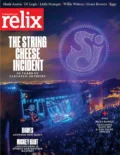Shout! Factory SF11030
Benefit shows are so commonplace nowadays that it is hard to envision a time when this concept didnt exist. However, there was no such thing as a benefit show until John Cleese rounded up his fellow Monty Python performers and a few other high profile British comedians for the Pleasure at Her Majestys 1976 benefit for Amnesty International. The performance was such a hit that Cleese returned three years later with musicians Pete Townshend, Tom Robinson, and John Williams in tow for The Secret Policemans Ball. Soon these Amnesty benefits would become semi-regular events, growing in stature and attracting Britains top flight performers.
Comedy is the main event at these shows, and somewhat surprisingly, the comedy has aged well. Classic Monty Python sketches, such as Dead Parrot or the Lumberjack Song, maintain their punch in front of a jubilant live audience, and old stalwarts Dudley Moore and Peter Cook demonstrate exactly why their pairing was considered a marriage of comedic genius before Moore found a career in Hollywood. As time passes throughout the series of five benefits, Cleese is sure to include up-and-coming performers, including a hilarious but previously unknown Rowan Atkinson, a young Hugh Laurie, the spaced-out Emo Phillips, and the delightfully vulgar Robbie Coltrane. By the final ball of this series in 1989, a definite transition is occurring from the uppercrust, cerebral stylings of Cleeses fellow Oxbridge comedians to the middle class, blue collar attitude of performers, such as the soon-to-be-famous Jennifer Saunders, who co-directed 1989s The Secret Policemans Biggest Ball with veteran Cleese.
Cleese was not a fan of pop music, so the first show featured nothing but comedy. In 1979, he decided to involve his friend, classical guitarist John Williams, and producer Martin Lewis made a motion to include Robinson and his gay rights anthem, Glad to Be Gay, as well as Townshend, who shines on a brilliant, solo acoustic rendition of Drowned and an acoustic duet with the barely audible Williams on Wont Get Fooled Again. By 1981, the cat was out of the bag, and scores of big name performers lined up for a slot, including Sting (delivering a great solo version of Message in a Bottle), Phil Collins (sitting at the piano and performing a chilling version of In the Air Tonight), Donovan (playing the appropriately optimistic Catch the Wind), and Eric Clapton, who is shown up by his dueling partner, Jeff Beck. The 1981 show ultimately reaches its zenith when Sting leads an all-star band through the finale of a reggae/ska-tinged rendition of I Shall Be Released. Unfortunately, 1987s The Secret Policemans Third Ball lacks the musical prowess of its predecessor and suffers from the horrible synthesizer-laden sounds that were indicative of its era. Neither Duran Duran, Peter Gabriel, Lou Reed, Kate Bush, David Gilmour, Joan Armatrading, or Jackson Browne produce anything of note, but the night is saved by a couple of phenomenal guitar picking duets from Dire Straits Mark Knopfler and American elder statesman, Chet Atkins. By 1989, the focus was once again on comedy, so music was off the bill, with the exception of a very funny joke involving the return of Williams.
Spread over three discs, The Secret Policemans Balls captures the shows in a variety of formats. Some were shot with actual film, while others were recorded on video. The result is hodgepodge of quality. Visually, everything is certainly passable, but sonically, many of the performances leave much to be desired. Nevertheless, the set is loaded with extras, including omitted performances and commentary from producer Lewis. Two documentaries are also included, the first being a surprisingly boring behind-the-scenes look at the first ball and the second being an interesting, all-encompassing look back at the series and its lasting effects. Speaking of those effects, Collins talks about how his performance gave him the strength to play piano in public, while Sting discusses how this show gave him the notion that he could break out on his own and forge a solo career. However, the most lasting effect came from singer Bob Geldof, who while performing in 1981, looked around a realized the power of an all-star benefit show. Four years later, he would organize the worlds most massive benefit concert, and after Live Aid, the concept of the benefit show would become a fixture of the entertainment and charity worlds.
- The Secret Policemans Balls
News
Archive- Bender Jamboree Reveals 2025 Lineup
- Lou Donaldson, Hard Bop and Soul Jazz Innovator, Passes Away at 98
- Brian Eno to Present Songwriting Workshops with School of Song
- GRAMMY Museum Presents Jay Blakesberg Photography Exhibit [1978-2008], RetroBlakesberg: The Music Never Stopped
- Mimi Fishman Foundation and WaterWheel Foundation Auction Signed Phish Summer 2024 Posters, Including Billy Strings Autographs
- GZA and Lettuce Join Forces for 2025 Tour, Performing ‘Liquid Swords’
- MerleFest Announces 2025 Artist Lineup and Late-Night Jam Details
- Analogue Productions Announces Miles Davis’ ‘Birth of the Blue,’ First-Ever Standalone Release of ‘Kind of Blue’ Sextet’s First Recording Session
Most Popular
- David Gilmour Addresses Synchronicity Theory Between ‘The Dark Side of the Moon’ and ‘Wizard of Oz’
- Music Heals International Announces “Fare Thee Well to Phil and Friends” in Annual Benefit Concert, Featuring David Nelson, Melvin Seals, Jay Lane, Dan “Lebo” Lebowitz and More
- Osiris Media Presents New Phish Taping Fictional Audio Drama “Family Tape Tree”
- Cris Jacobs Welcomes Mike Gordon at Nectar’s
- Dan “Lebo” Lebowitz to Celebrate 50th Birthday at Sweetwater Music Hall with Members of ALO, Tea Leaf Green and More
- Goose in Cincinnati: New Material, Reimagined Approaches, Bust Outs and More
- Southern Avenue’s Blake Rhea Killed in Memphis Shooting
- Two Generations of Garfunkels Unveil Collaborative ‘Father and Son’ Album


No Comments comments associated with this post